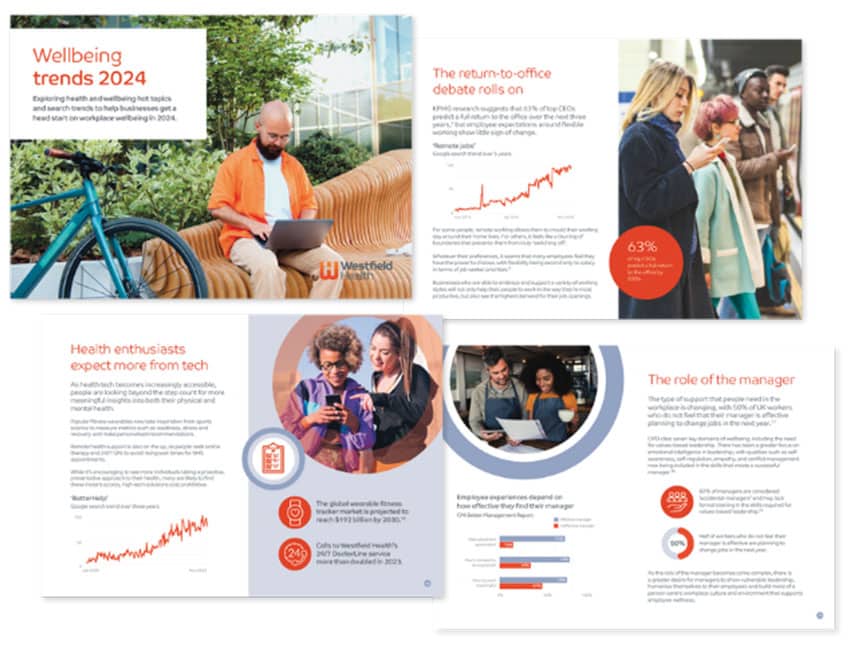Explore the key findings
What emerging health and wellbeing themes do HR, people managers and wellbeing professionals need to stay informed about this year?
Our yearly report pulls together insights from Google search data, national statistics, social media, consumer trends and new research.

Rethinking flexibility at work
The return-to-office debate rolls on
KPMG research suggests that 63% of top CEOs predict a full return to the office over the next three years, but employee expectations around flexible working show little sign of change.
The power has shifted in employees’ favour, with many actively seeking flexible roles, and businesses that are able to embrace a variety of working styles will be likely to attract top talent.
‘Remote jobs’ Google search trend over 5 years
100
50
0
Nov 2018
Apr 2021
Nov 2023
Almost half (47%) of UK workers say the pandemic has reduced the importance they place on work.
Employees want to feel engaged - wherever they work.
Gallup research shows that low engagement impacts stress 3.8x more than work location — good news for employers who can’t offer remote working.

Reinventing work-life balance
In 2024, work-life balance means more than just closing your laptop at 5pm. Our home lives remain a high priority, with 54% of WFH-ers saying they plan to have more free time in the future.
Rather than a blanket demand for remote working options, workers are now more aware of their own unique needs. And that could be anything from co-ordinating the school run, to managing their periods or ‘unretiring’ into a part-time role.
In short, companies who can support work-life balance are also supporting a more diverse workforce to perform at their best.

Consumer wellness in the workplace
The wellness craze conveyor belt
Trends such as ice baths, gut health, collagen supplements and nap pods have taken TikTok by storm, igniting public interest in wellbeing and promising silver-bullet remedies to common health worries.
But are these trends helping us to form healthy habits and drive lasting change? To understand where to focus our efforts, we increasingly find ourselves trying to separate evidence-based solutions from fleeting fads.

300%
increase in searches for ice baths

180,000
people on ZOE’s health study waitlist

850%
increase in searches for nap pods


What does this mean for the workplace?
Despite increased consumer interest in health and wellbeing, the UK’s sickness absence rate is the highest it’s been since 2004.
People now expect their employer to support their health, but how can businesses harness this enthusiasm and turn it into meaningful action, without getting swept up in short-lived wellness trends?
- Draw on existing wellbeing research and choose tried and tested solutions before exploring more experimental options.
- Measure the impact of your spend to demonstrate its value and know when to make changes to your approach.
- Collect regular feedback on your wellbeing offering to prioritise the support people really need.

AI and health tech
‘AI health’ Google search trend throughout 2023
100
50
0
Jan 2023
Nov 2023
AI drives personalised healthcare
AI may be the buzzword of the year, but an array of technologies are providing innovative ways to support our health.
In June, the government pledged £21 million to roll out artificial intelligence across the NHS, helping to diagnose cancer, strokes and heart conditions.
AI is already being used to analyse patient DNA, tailor treatment to individual needs and provide better outcomes through a personalised approach.
Health enthusiasts expect more from their tech
As health tech becomes increasingly accessible, people are looking beyond the step count for more meaningful insights into both their physical and mental health.
Popular fitness wearables now take inspiration from sports science to measure metrics such as readiness, stress and recovery and make personalised recommendations.
Remote health support is also on the up, as people seek online therapy and 24/7 GPs to avoid rising wait times for NHS appointments.

The global wearable fitness tracker market is projected to reach $192 billion by 2030.
Calls to Westfield Health’s 24/7 Doctorline service more than doubled in 2023.

The need for connection
‘Andy’s Man Club’ Google search trend over three years
100
50
0
Nov 2020
Nov 2023
third place
noun.
Social surroundings that are separate from the two usual social environments of home and the workplace. Examples include churches, cafes, pubs, gyms and libraries.
Seeking support from a third place
With NHS wait times for mental health treatment at an all-time high, people are seeking support away from professional services.
- Community venues are integrating mental health into people’s daily lives.
- There have been investments in mental health training for barbers.
- Men are increasingly looking for in-person support from groups such as Andy’s Man Club.
Loneliness in the workplace
The change in communication styles since the pandemic has caused a shift in the ways that people connect, with 50% of employees feeling lonely at work at least some of the time.
Remote workers do not have higher levels of loneliness than on-site workers, although 84% of onsite workers agree they feel close to their colleagues, compared to only 44% homeworkers.

Loneliness is estimated to cost UK employers £2.5 billion a year.
Loneliness is now considered a global health concern.
Employee experiences depend on how effective they find their manager
Effective manager
Ineffective manager
I feel valued and appreciated
I feel motivated to do a good job
I find my work meaningful
0%
50%
100%
The role of the manager
The idea of an ‘effective manager’ is changing to emphasise vulnerable leadership and person-centric workplaces.
Effective management skills are key to employee retention, productivity and wellbeing.
Skills such as empathy, self-awareness and conflict management are increasingly becoming a priority for successful managers.
82% of managers are considered “accidental managers” and may lack formal training.
Half of workers who do not feel their manager is effective are planning to change jobs in the next year.

Download the full wellbeing trends report
What wellbeing trends will we see in the workplace in 2024?
Explore the most-searched health and wellbeing topics and what we should expect from these trends looking forward to 2024, including more tips and advice for managers and HR teams.
